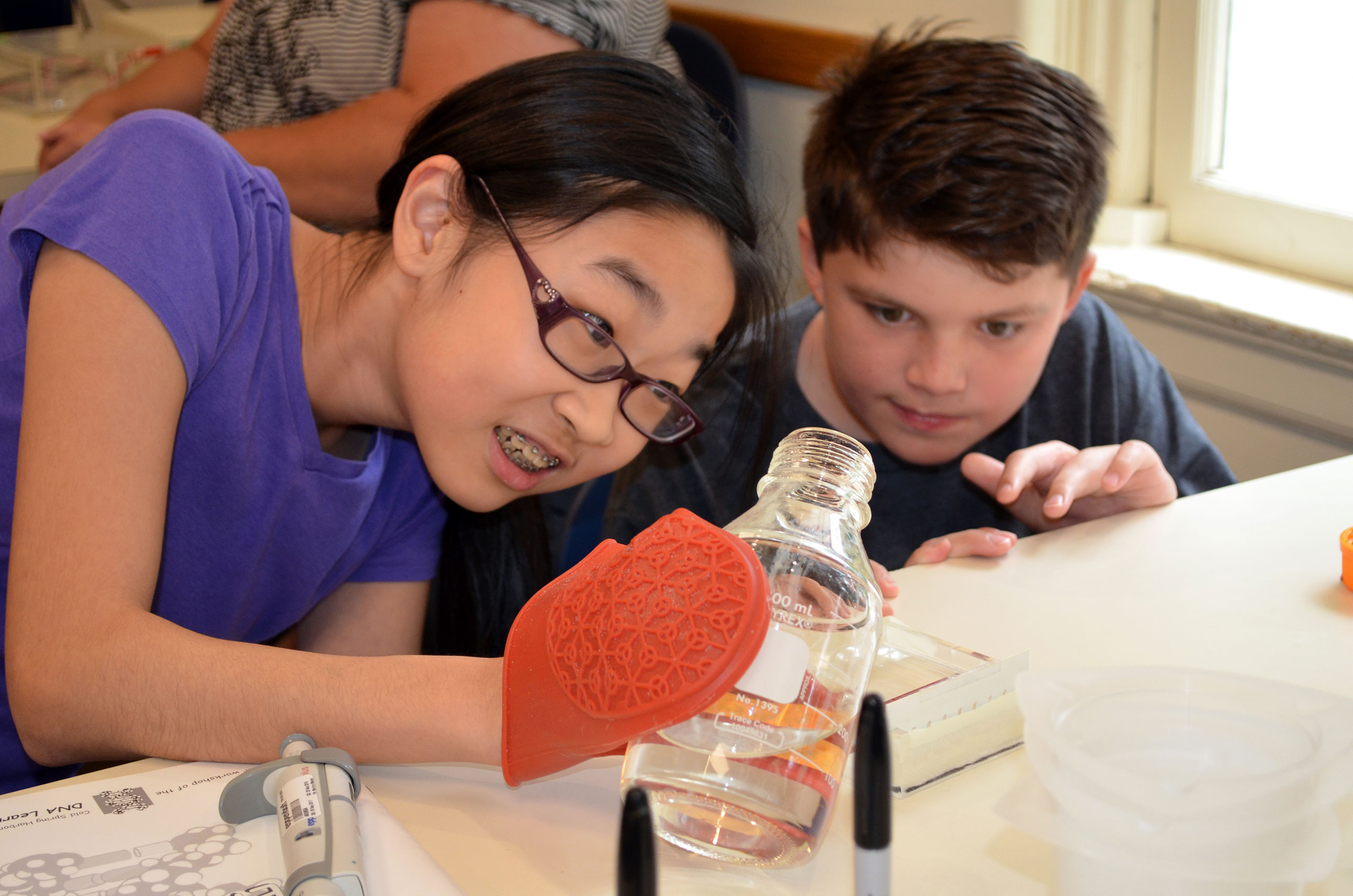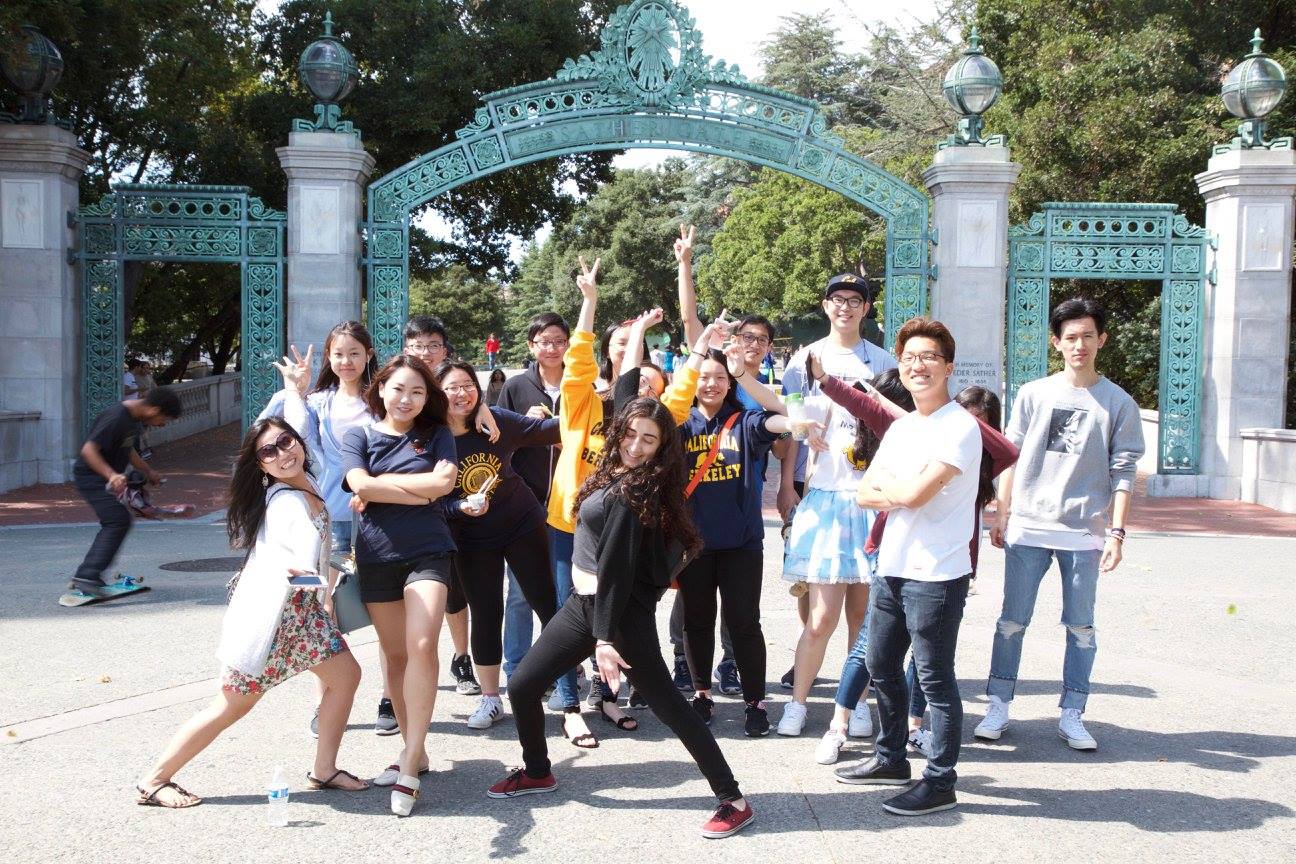NUS Youth Programme中文官网
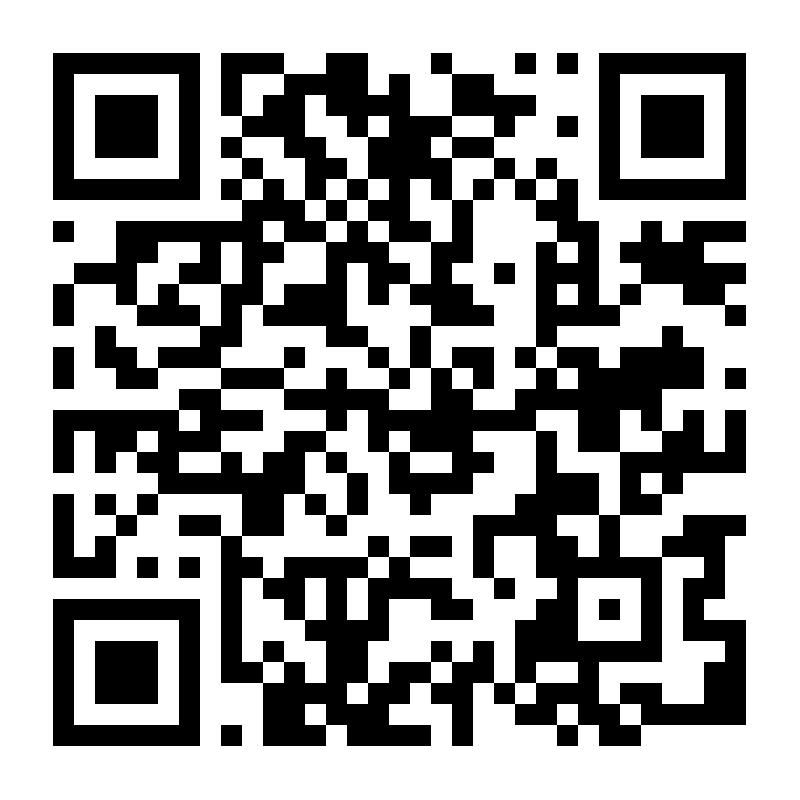
Scan to sign up
Participation process
1.Sign up:
Scan the above QR code, fill in the personal information, select the project and subject, submit the registration information, and complete the registration
2.Pay the fees:
Please pay the fee after reading and signing the agreement
3.Preparation:
- Independent preparation: Registered students can prepare their language and knowledge independently according to the selected courses
- Join the class group: Pay attention to the class opening email 1-2 weeks before the project starts, and join the group in time
4.Participation:
Attended classes on time and completed the homework and completion assignments assigned by the tutor
5.Obtain the authoritative project completion certificate:
Students who meet the completion requirements (attendance; Completion work, etc.), will receive an official project completion certificate
6. More opportunities:
At the end of the project, students with excellent performance will have the opportunity to get an interview invitation, and the interview content will have the opportunity to be posted on ASDAN's wechat or Outlook student weekly.In addition, participating students can also sign up to join Astan World Famous School Club, Club members will have the opportunity to participate in more world famous school projects as a teaching assistant, and get the opportunity to communicate and cooperate with international famous school tutors.
Subjects
Media Communication and Marketing
Biomedicine
Economics
Psychology
— National University of Singapore —
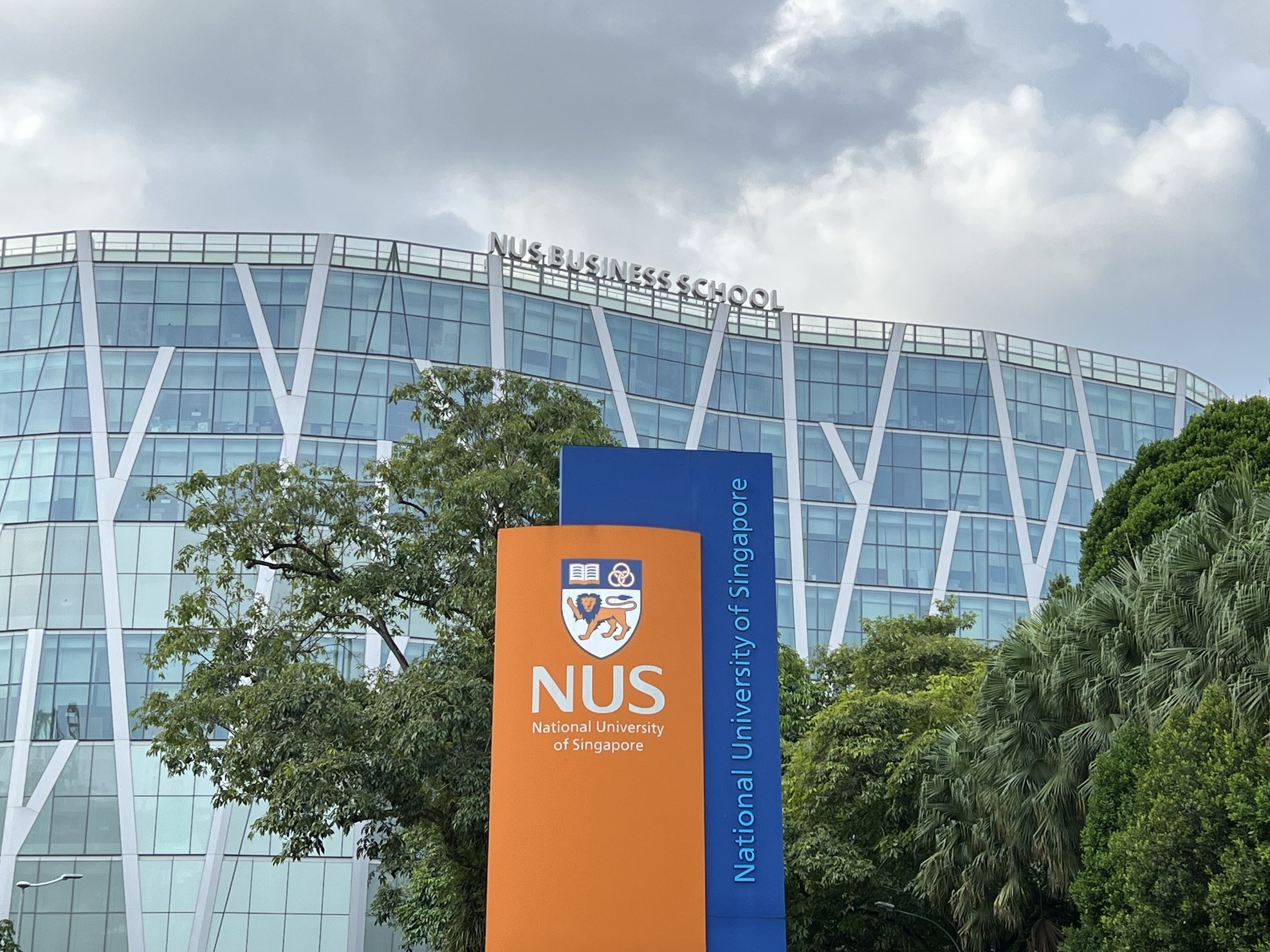
National University of Singapore
The National University of Singapore (NUS) is a leading global university centred in Asia. NUS is well known for its research strengths in Mathematics, Economics, Life Sciences and Biomedicine, Social Sciences and Natural Sciences. NUS ranked Asia's top university and 8th in the world in the 2026 QS World University Rankings. Notable subject-specific rankings include 6th in the world for Computer Science and Information Systems, 11th for Data Science, 5th for Physics and Astronomy, and 3rd in Asia for Life Sciences and Medicine. Furthermore, NUS is positioned 1st in Asia for both Economics and Econometrics, as well as Psychology, according to QS.
School of Continuing and Lifelong Education
The National University of Singapore's School of Continuing and Lifelong Education (SCALE) was established in June 2016. It has curated a series of academic programs for outstanding global youth, aiming to expand knowledge, enhance innovative potential, instill a sense of global responsibility, and comprehensively cultivate 21st-century competencies. Through the innovative culture, outstanding academic influence, and global responsibility of the National University of Singapore, SCALE seeks to empower students in navigating the digital age and developing essential skills for the 21st century.
The academic component is delivered by:
NUS School of Continuing and Lifelong Education

— Why Us? —
2024年暑假,阿思丹(ASDAN China)与新加坡国立大学持续与终身教育学院、文学暨社会科学院携手开放线下项目,同期开放数据分析、生物医学、人工智能与物联网、纳米物理、经济学、心理学六大主题学科,涵盖文理不同领域。阿思丹学员将亲自前往新加坡国立大学,在专业教师团队的领导下感受深度实践式学习模式,深入研讨学科尖端课题,拓展学术眼界,激发专业研究兴趣。
NUS Immersive Learning Experience
This programme is offered by the School of Continuing and Lifelong Education and The Faculty of Arts and Social Sciences at the National University of Singapore. During the programme, students will immerse themselves in the NUS campus environment, experiencing the authentic atmosphere of a prestigious institution.
Certificate of Competence
Successful participants who complete all requirements (meet minimum 85% overall attendance rate and complete assessments and post-programme evaluation on time) of the programme will receive a certificate of completion and assessment reports issued by NUS. Some outstanding participants will also receive a commendation letter. Additionally, a corporate training certificate issued by the host company will be awarded upon the completion of corporate visit.
Project-based Learning
NUS Youth Programme selects and assigns tutors to conduct the course. The course is divided into two modules: lecture and group work. Project-based learning will develop students' teamwork skills while stimulating critical thinking, creativity, and problem-solving skills to prepare them for undergraduate study in the future.
Visits to Prominent Enterprises and Cultural Exploration
During the programme, students will have the opportunity to visit world-renowned companies(e.g. Grab,L’Oréal), engage closely with industry experts and workplace professionals, gaining insights into industry trends. Additionally, there will be opportunities to explore iconic entertainment and cultural venues in Singapore, such as the National Museum of Singapore, the Night Safari, and Merlion Park.
— Teaching Faculty —
*The final instructor will be decided by NUS
-

Karen Ong
National University of Singapore Distinguished Lecturer in the Department of Communications and New MediaKaren Ong is a guest lecturer in the Department of Communications and New Media at the National University of Singapore. She has over ten years of extensive teaching experience and has taught courses in mass communication, marketing, and branding at renowned universities such as the National University of Singapore, Nanyang Technological University, Singapore University of Technology and Design, and Republic Polytechnic. In addition, Karen has been engaged in public relations and brand marketing work in the international market for the past 20 years. Karen is committed to combining her public and marketing experience with her understanding of the education field.
Seow Teck Keong
National University of Singapore Deputy Director and Associate ProfessorProfessor Teck Keong has extensive teaching experience teaching basic biology and biochemistry courses in the Department of Biological Sciences at the National University of Singapore. His appointments as Resident Fellow of King Edward VII Hall and as Director for Residential Life and Resident Fellow at the College of Alice and Peter Tan have also motivated him to leave a lasting and positive impact on his students. -

Jia Lile
National University of Singapore Assoc. Prof. in the Department of PsychologyAssociate Professor Jia Lile graduated with a Bachelor of Social Sciences (First Class Honours) from the Department of Psychology, NUS, in 2007. In 2012, Assoc. Prof. Jia obtained his Ph.D. in Social Psychology from the Department of Psychological and Brain Sciences at Indiana University Bloomington, USA. He currently directs the Situated Goal Pursuit Lab (the SPUR lab) at the Department of Psychology. He is also a core faculty member of the Institute for Application of Learning Science and Educational Technology and the Center for Population Health. His research has received generous funding from the university and various public agencies.
Guillem Riambau
National University of Singapore Visiting Scholar, PhD from Boston UniversityDr Guillem Riambau holds an undergraduate degree in economics and another one in political science, both awarded by the Universitat Autònoma de Barcelona (Spain). He obtained his PhD in Economics from Boston University in 2012 (USA). Dr Riambau has ample experience teaching in the most diverse settings and classrooms: he has lectured in Boston University, Harvard University, Universitat Autònoma de Barcelona, Yale-NUS College and NUS, among others. He currently holds an assistant professor position at the Universitat de Barcelona, and regularly visits NUS.
— Course Content —

Media Communication and Marketing

Biomedicine

Nanophysics

Economics

Psychology
Media Communication and Marketing
● Social Media Analysis
● Public Opinion Monitoring and Analysis
● Media Content Management and Assessment
● Principles of Crisis Public Relations
● Crisis Public Relations Strategy
* The above are teaching themes from previous years, provided for reference.
The programme will also discuss the fundamentals of cellular and molecular biology (e.g. how viruses entry the host and interact with host cells).
● The foundation knowledge of cell and molecular biology
● Virus Action Research
● Mathematical Modelling of Epidemics Workshop
● Bioinformatics
● Life Sciences and Ethics
* The above are teaching themes from previous years' NUS programmes, provided for reference.
In this course, students will gain insights into the latest artificial intelligence and machine learning technologies. They will grasp the fundamental principles of artificial intelligence and machine learning and their practical applications in various modern businesses. Students will understand how machine learning can enhance operational performance and efficiency in business. Mentors will guide students in becoming familiar with the Orange Interface (an open source data visualization and machine learning modeling tool) and understanding the entire process, from data import and preprocessing to model training and evaluation.
● Introduction to AI
● AI Applications: State of the ar
● How to install and use Orange
● Clustering, Function Estimation, Classification and KNN
* The above are teaching themes from previous years' NUS programmes, provided for reference.
● Nanoscience and Materials
● Applications of Nanotechnology
● Exploration of Optical Microscope Techniques
● Exploration of Optical Microscope Techniques
● Focused Laser Beam Techniques
● Methods for Fabricating Nanostructures
* The above are teaching themes from previous years' NUS programmes, provided for reference.
Economics Explorer: Understanding Market Forces and Economic Behavior
● Economic Policies
● Microeconomics
● Macroeconomics
● Economic Theory
● The Impact of Economic Decision-Making
● Economic Choices in a Globalized Context
* The above are teaching themes from previous years' NUS programmes, provided for reference.
The Human Puzzle: Unravelling the Mysteries of the Mind
● Psychological Analysis
● Classic Theories in Psychology
● Scientific Research in the Field of Psychology
● Modern Impact of Technology on Psychology
● Truth Behind Human Thought and Behavior
● Influence of Social Networks
* The above are teaching themes from previous years' NUS programmes, provided for reference.
— Sample Schedule —
*The specific schedule may be subjected to slight adjustments based on actual circumstances, some or all courses may be temporarily adjusted to be conducted in the afternoon according to NUS SCALE. Duration: 7 days Academic component: NUS Youth Programme-15 contact hours, delivered by NUS SCALE. Corporate Visit and Cultural Exploration - 5 Sessions, arranged by ASEEDER
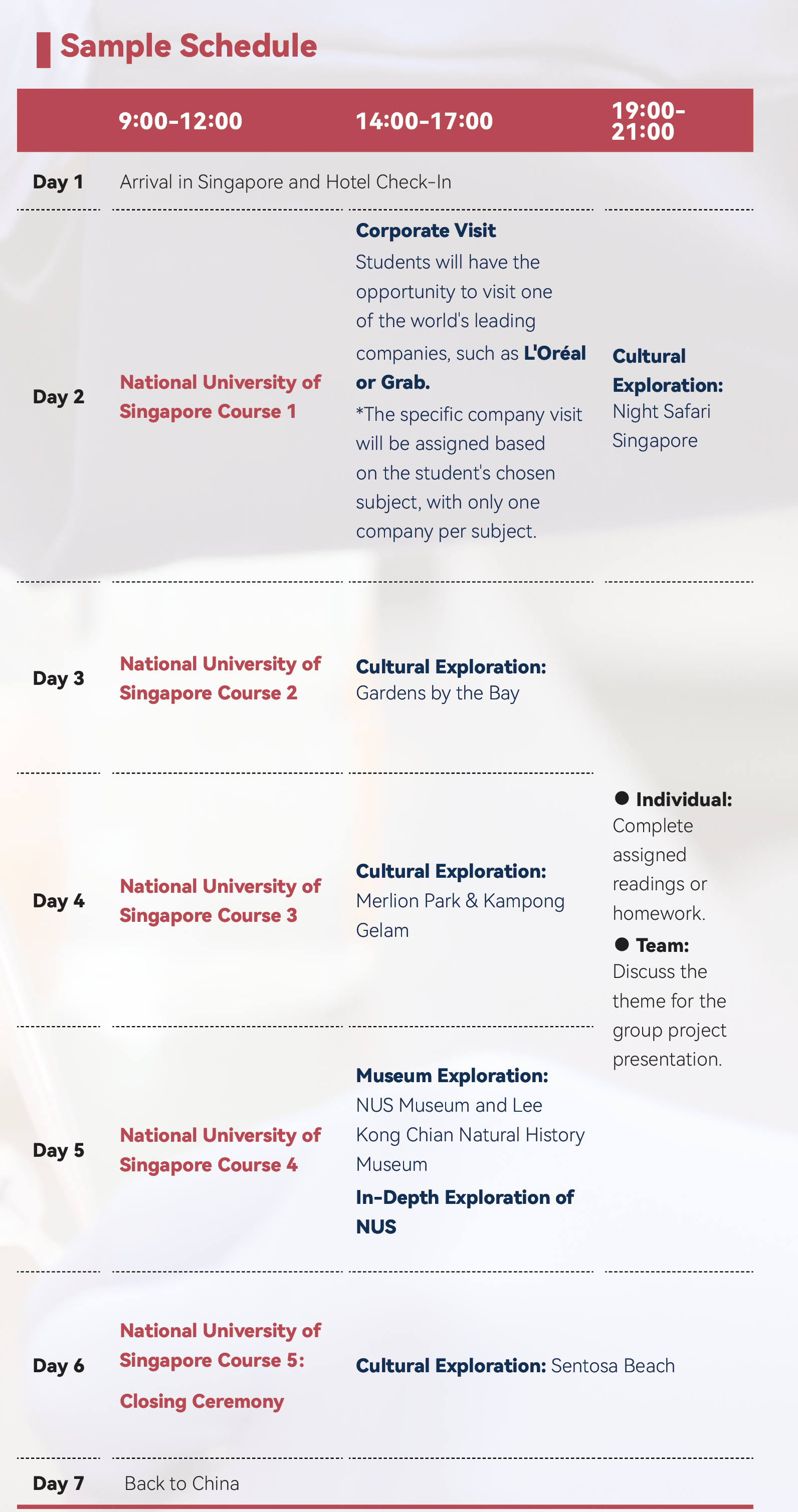
— Outcomes —
*The images shows the offcial participation certificate and assessment report sample of the School of Continuing and Lifelong Education (SCALE) at the National University of Singapore.
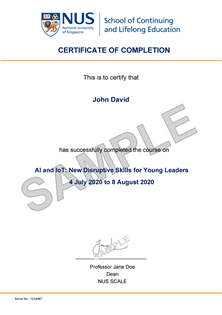
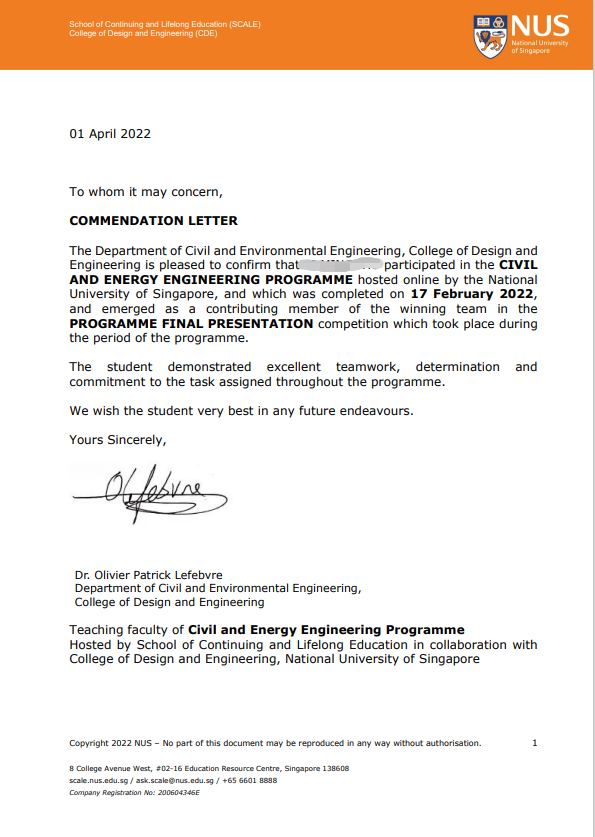
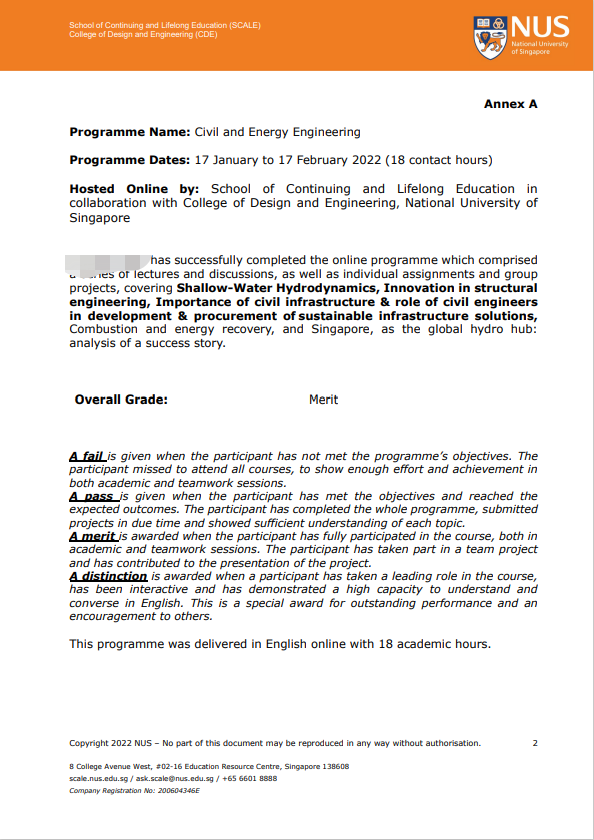
*The images shows the official participation certificate and evaluation report sample of the Faculty of Arts and Social Sciences (FASS) at the National University of Singapore.
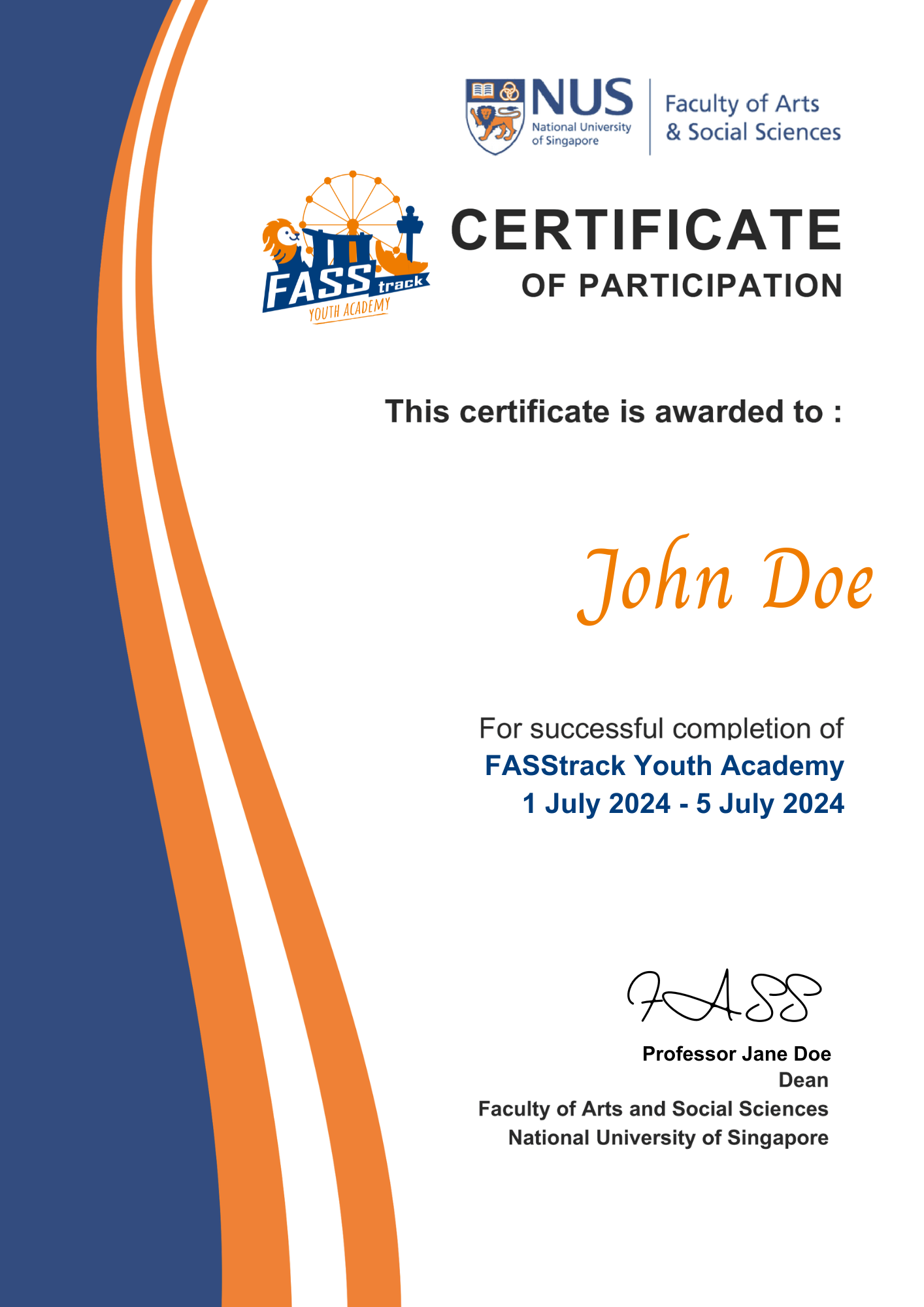
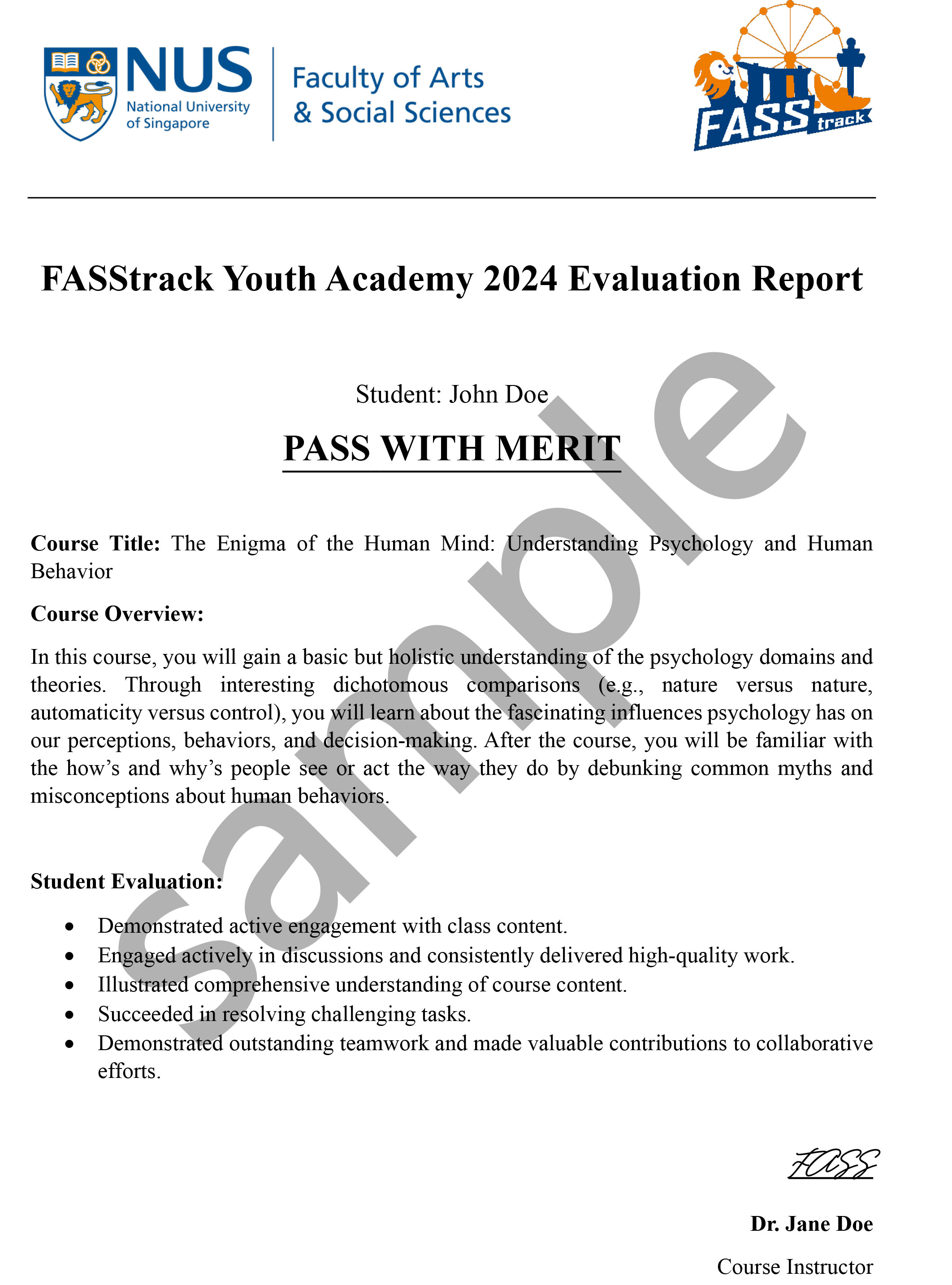
— Application —
Details
- Date: Feb 8th - Feb 14th, 2026 (7 days) or Feb 22nd - Feb 28th, 2026 (7 days)
- Location: Singapore
- Quota: 40 students per subject
Requirements
- English language level equivalent to IELTS level 6.0 or TOEFL 80
- Phone/online interview with an ASEEDER staff member is required if no valid language test results are submitted
Fee
- Includes:tuition, corporate visit, cultural exploration fees; ASEEDER group leader service fee; local transportation fees of cultural exploration and corporate visit; international insurance fees; learning materials fees.
- Excludes:
- accommodation fees, shuttle fare between the hotel and campus and between the hotel and airport
- * optional logistics booking service: including shuttle fare(only applicable to designated group coach), double room bed (shared) with breakfast in a 4-star hotel, room is limited.
If you opt out of the logistics service package, please note that minors in Singapore require adult accompaniment for hotel stay. - international transportation costs to and from Singapore (departure and arrival from one or multiple cities including Beijing, Shanghai, Shenzhen or Hong Kong, you can use a third-party service or ASEEDER' s unified service);
- the food expenses during the stay in Singapore(SGD 15-20 per meal)







